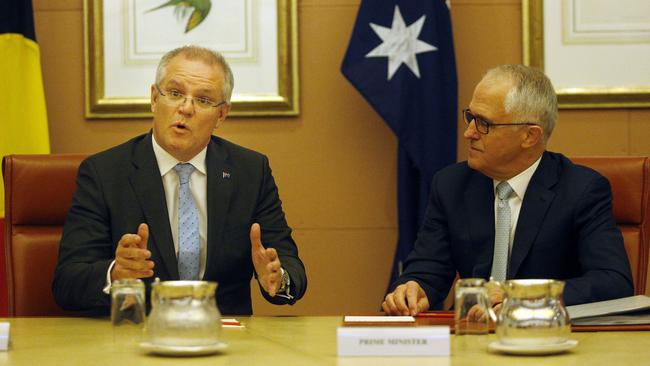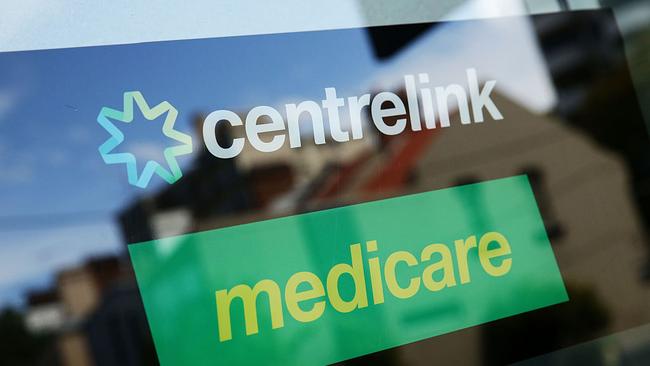Federal Budget 2017: Lazy welfare bludgers to lose payments under demerit system
WELFARE bludgers will lose their payments for up to two months under a demerit-point system to be announced in today’s Federal Budget.
- What the Federal Budget has for SA, so far
- No SA losers in $18bn spend on schools
- Foreigners get $15bn in welfare
WELFARE bludgers will lose their payments for up to two months under a demerit-point system to be announced in today’s Federal Budget.
Recipients who fail to turn up to job interviews or work-for-the-dole appointments will start losing payments when they reach four points — and when they hit seven demerit points, they will have their payment cut off for eight weeks.
But some people who commit serious offences could lose all seven points instantly.
The Turnbull Government will today announce the tough new system as one part of major welfare sector reform that includes scrapping Newstart allowance, combining it with other payment categories, and rebadging it under a new name to simplify the complex system.

Arriving at Parliament House this morning, Mr Morrison said he understood that while the Australian economy has grown ahead of other economies not all voters have experienced the benefits.
“Australians have been making big sacrifices to ensure that we’ve achieved the growth that we’ve had and I want to tell them that it’s been worth it,” he told reporters.
“I’m responsibly optimistic that there are better days ahead.”
Mr Morrison’s Budget today will show debt at record levels, climbing beyond $500 billion, with the Treasurer pledging restraint by keeping spending growth to around 2 per cent.
Mr Morrison will walk away from many of Tony Abbott and Joe Hockey’s 2014 budget measures, that were deemed unfair, and will be conservative with revenue forecasts, given the volatility of iron ore prices.
Mr Morrison will pitch his Budget as built around fairness, focusing on building the economy to secure more and better paid jobs, guaranteeing the essential services that Australians rely on, putting downward pressure on cost of living and bringing the Budget back to balance.
Welfare sector reform is designed to stop recipients taking taxpayers for a ride, with a focus on people who are capable of working but refuse to turn up to job interviews, contributing to the exploding cost of welfare.
The annual welfare bill is expected to climb from $160 billion this year to more than $277 billion by 2026, if no changes are made.
The seven-point system will be split into two phases, an initial four-point phase and a second three point phase.
When a welfare recipient accumulates three points, they will have to attend an interview to discuss their situation and will receive a warning, in keeping with the Budget’s theme of fairness.
At four points, recipients will start losing their welfare payments and at 7 points, they will be cut off entirely.

Some serious offences will mean a welfare recipient will go straight to the “intensive compliance” phase and lose payments for eight weeks.
Australian Council of Social Service chief executive Cassandra Goldie said the government was “way off track” and its measures were likely to be “simply cruel and neglectful”.
“We don’t have a big problem with social security compliance; the government already has extensive powers in this area,” she said.
“If a person is giving up, then that should worry us and we should reach out and assist that person, not punish them.”
Mr Morrison told The Advertiser that the focus on economic growth, guaranteed services for South Australians and downward pressure on the cost of living was “recognition of just how important those are to people”.
Mr Morrison also said the Budget would build on promises for SA made last year, with the multi-billion submarine and shipbuilding program.
“We’ve moved on, we’re looking to break ground on the key facilities,” he said.
“Deals are being struck with the French. An enormous amount of progress has been made, that will generate 5000 jobs, many in SA.”
The State Government is pushing for more infrastructure pledges but is unlikely to get a commitment to funds for extending the tram network.
They also want the Federal Government to pitch in for the Gawler rail electrification project. State Transport Minister Stephen Mullighan said the tender for that project will begin tomorrow.
He wants the Federal Government to match the state’s $152.5 million commitment — Federal funds were withdrawn when Tony Abbott was Prime Minister.
What’s in the Federal Budget, so far
FOR SA
■$68 million for Australia’s first lifesaving Proton Beam Therapy facility in Adelaide from 2020.
■ Every SA school will get more money under the Government’s Gonski 2.0 reforms, with funding in the state set to grow by 63.5 per cent over the next decade.
■ $100 million to help businesses in SA and Victoria transition to advanced manufacturing once Holden closes.
■ $133 million for veterans exposed to radiation in nuclear bomb testing in WA and SA.
HEALTH
■ Some medicines will be cheaper for patients and Government will save $1.8 billion through a price deal with the pharmaceutical industry and a new system which encourages doctors to prescribe generics.
■ Chemists to get taxpayer funding to compensate for lower prescription volumes and $600 million for in-pharmacy diabetes checks.
■ Medicare rebate for specialist consultations will rise in 2018, but rebates for specialist procedures won’t be indexed until 2019.
EDUCATION
■ Gonski 2.0 will inject an extra $18.6 billion into schools over the next decade. Almost all schools will be better off, with average spending growing more than
4 per cent a year.
■ A national agreement to ensure four-year-olds have access to 15 hours of preschool a week will be extended to the end of next year.
■ Legislating ongoing support for the $592 million Higher Education Participation program.
■ $2.8 billion in savings by increasing maximum student university fees by some 1.8 per cent each year between 2018 and 2021, leading to a 7.5 per cent increase.
WELFARE and FAMILIES
■ $370 million for one-off benefits to help pensioners and parent payment recipients pay their power bills. Singles will receive $75 and couples $125.
■ The loopholes in welfare rules used by some to avoid participating in work-for-the-dole or attending job interviews will be tightened.
■ Parents who refuse to have children immunised will lose $28 a fortnight in family payments.
■ $5 billion worth of cuts to family tax benefits, facing defeat in the Senate, have been shelved.
■ Bludgers will face a driver style demerit system, risking welfare payments if they fail to attend job interviews or miss work-for-the- dole appointments.
HOUSING
■ Aspiring first home buyers to be able to deposit a capped amount of pre-tax income in special accounts to save deposits.
INFRASTRUCTURE
■ The Budget will include $50 billion for infrastructure projects.
FINANCES
■ The Budget will distinguish between money borrowed for capital projects (“good debt”) and for expenses (“bad debt”).
■ Budget watcher Access Economics predicts the deficit will be $38.3 billion for 2016-17 and (in the absence of policy changes) $20.9 billion in 2018-19.
IMMIGRATION
■ Savings expected from planned closure of Manus Island Immigration detention centre.
MEDIA
■ Gambling ads to be banned during live sports broadcasts before 8.30pm.
■ Annual licence fees for free-to-air TV and radio stations to be scrapped, saving station owners about $130 million.
■ New broadcast spectrum fees to raise about $40 million.
■ Reduction in the number of sporting fixtures on the “anti-siphoning” list.
■ $30 million to help subscription TV increase coverage of women’s and niche sports.
POLICE
■ $321 million for the AFP to fight terrorism, cyber and gang crime.
VETERANS
■ $350 million boost to the Department of Veterans’ Affairs, including $30 million for non-liability mental health services.
